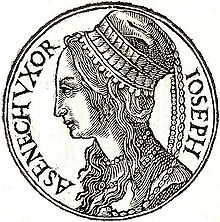
Back أسينات Arabic অসেনাথ Bengali/Bangla Asnat Breton Асенат CE Asenat Czech Asnath Welsh Asenat German Ασινέθ Greek Asenat Spanish آسنات Persian
Aseneth | |
|---|---|
 Asenath from Guillaume Rouillé's Promptuarium Iconum Insigniorum | |
| Saint | |
| Honored in | Catholic Church[1] Eastern Orthodox Church |
| Feast | 13 December[1] (Catholic Church) Sunday of the Holy Forefathers (Eastern Orthodox Church) |


Asenath (/ˈæsɪnæθ/, Hebrew: אָסְנַת, Modern: ʾŎsnát, Tiberian: ʾĀsnaṯ;[3] Koine Greek: Ἀσενέθ, Asenéth) is a minor figure in the Book of Genesis. Asenath was a high-born, aristocratic Egyptian woman.[4] She was the wife of Joseph and the mother of his sons, Manasseh and Ephraim.
There are two Rabbinic approaches to Asenath. One holds that she was an Egyptian woman that converted to marry Joseph. This view has her accepting God before marriage and then raising her two sons in the tenets of Judaism. This presents her as a positive example of conversion to Judaism and places her among the devout women converts. The other approach argues she was not Egyptian by descent, but was from the family of Jacob. Traditions that trace her to the family of Jacob relate that she was born as the daughter of Dinah.[5] Dinah was raped by Shechem and gave birth to Asenath, whom Jacob left on the wall of Egypt, where she was later found by Potiphar.[citation needed] She was then raised by Potiphar's wife and eventually married Joseph. However, in Bereshit Rabbah 80:11 she is not stated to be Dinah's daughter but rather her rape resulted in giving birth to Shaul the son of Simeon.[6][7]
Asenath's importance is related to the birth of her two sons, who later become forefathers of two of the Twelve Tribes of Israel.[4]
- ^ a b "Asenet (Asenat)". DEON.pl (in Polish). Retrieved 2021-12-12.
- ^ Cite error: The named reference
:1was invoked but never defined (see the help page). - ^ Khan, Geoffrey (2020). The Tiberian Pronunciation Tradition of Biblical Hebrew, Volume 1. Open Book Publishers. ISBN 978-1783746767.
- ^ a b "The Egyptian woman Asenath in the Bible". Archived from the original on 2016-08-31. Retrieved 18 November 2020.
- ^
 One or more of the preceding sentences incorporates text from a publication now in the public domain: Singer, Isidore; et al., eds. (1901–1906). "1905-asenath". The Jewish Encyclopedia. New York: Funk & Wagnalls.
One or more of the preceding sentences incorporates text from a publication now in the public domain: Singer, Isidore; et al., eds. (1901–1906). "1905-asenath". The Jewish Encyclopedia. New York: Funk & Wagnalls.
- ^ https://www.sefaria.org/Genesis.34.26?lang=bi&with=Commentary&lang2=en&p3=Bereshit_Rabbah.80.11&lang3=en&w3=all&lang4=en
- ^ https://www.sefaria.org/Genesis.34.26?lang=bi&aliyot=0&p2=Radak_on_Genesis.34.26.1&lang2=bi&w2=all&lang3=en
© MMXXIII Rich X Search. We shall prevail. All rights reserved. Rich X Search